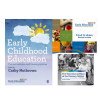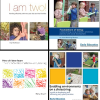Letter to the next Prime Minister
The letter below sets out our key asks for the next government.
by Victoria Jefferies
It’s rarely plain sailing in Early Childhood Education and Care (ECEC) with its myriad of navigational challenges. Neoliberalist tides threaten to submerge the ship: the economisation of education reduces our youngest children to passive beings, “yet to be realised human capital” (Robert-Holmes and Moss, 2021:106). Nurseries and pre-schools in a fragmented industry are positioned as competitors, promoting a blame culture in which children’s educational outcomes are perceived as the result of parents’ educational choices (Drew, 2019). Settings market themselves as best placed to promote children’s future educational success, all of which renders children and ECEC as commodities (Vandenbroek et al, 2023). Education is thus not seen as a public good or place of nurture (Moss, 2009; Richardson, 2022), but rather an investment requiring evidence of good returns (Ball, 2021).
Curriculum standardisation has trickled down into ECEC where “school readiness” has become the dominant culture and development must lead learning (Wood, 2020). Children must be adequately prepared for the next stage, with transmissive education becoming the usual modus operandi. Basic standards, milestones of neurotypical development and a uniform curriculum deny what anyone working in ECEC knows: it’s messy, children are unique and there is absolutely no one-size-fits-all (Moss, 2009), but it’s all regulated by Ofsted to check compliance with the Department for Education’s agenda that ECEC is providing “the right foundation for good future progress through school and life” (2023:5, my emphasis).
The status of play in this tempestuous sea state is increasingly maligned (Cameron and Moss, 2020). Play – spontaneous, intrinsically motivated enjoyment and exploration – is a slow pedagogy (Clark, 2023) constrained by measurement, which tends to force it to follow adult-insisted agendas (Fisher, 2024). Children’s rights (particularly Articles 12, 13, 29 and 21 of the United Nations Convention on the Rights of the Child, 1989) are side-lined and it is hardly surprising that educators feel anxiety about play in these neoliberalist seas.
The ship – the voice of educators – is rarely heard or heeded, however, despite the potential of their embodied and practical knowledge to broaden our epistemological base. Evidence-based research, focusing on the relationship between teacher behaviour and learner outcome, leads to a lack of representation (Nind et al, 2016). Training therefore becomes focused on pedagogy as a positivist science or, at best, a craft which can be perfected – making the ship the most streamlined and watertight it can be, to continue the metaphor.
Enter a learning circle I participated in throughout last year. Led by Julie Fisher and run by Early Education, it focused on Pedagogical Leadership. Beginning with my vision for ECEC, helpfully shaped by my MA thinking, I was encouraged to consider the non-negotiable elements of my pedagogy in order to shape our setting’s curriculum through effective leadership. This became the starting point for charting a course into the unknown.
My working definition is currently:
Children, staff and families united around the vision of rich, capable, empowered children, who are given autonomy to direct their own learning, shaped by meaningful interactions from attuned and supportive adults. This requires uninterrupted, adventurous, open-ended play: valued as the way to develop creative, innovative, curious problem-solvers who love learning.

Being clear about why we are doing what we are doing helps to build a team united by a shared vision. Through this lens, we can look at exploring the curriculum conundrum of what lies between what we want the child to learn and what the child wants to learn. It helps educators understand the overlap and consider how children will best learn concepts, skills and attitudes. The learning circle and the new edition of Starting from the child? (2024) helpfully unpack these curriculum questions, helping consider how we can practically navigate our way between the sequenced, intentional adult curriculum and the spontaneous, idiosyncratic child’s curriculum, while advocating for children, listening to them and defending their rights. It is a move away from audit and cost, and towards relationship and worth (Adams, 2015:5).
Becoming clearer about my pedagogical vision has prepared me to drive it forward in a rough sea state, to have the courage to take risks and to have confidence in the face of opposition – and opposition will surely come when the pursuit of knowledge, measurable and measured, is not the ultimate goal. I highly recommend the new edition of Julie’s seminal work as we, thoughtful pedagogues, consider how to improve visibility and chart a course into the unknown.
If you too have thoughts about how we navigate the seas in which we find ourselves, please engage with this post and share.
Victoria Jefferies is an Early Years Teacher in a PVI nursery in Lancaster and also completing a MA in Early Years Education at Edge Hill University. Her main areas of interest are the pedagogy of adventure and practitioner voice.
Join Julie Fisher’s next Learning Circle on adult-child interactions or browse the full programme of upcoming professional learning.
Images used under Creative Commons License
Adams, P. (2015). In defence of care: Gilligan’s relevance for primary education. Pedagogy, Culture & Society, 23(2), pp. 281–300. https://doi.org/10.1080/14681366.2014.994662
Cameron, C. and Moss, P. (2020). Transforming Early Childhood in England. 1st ed. London: UCL Press
Clark, A. (2023). Slow Knowledge and the Unhurried Child. 1st ed. Milton: Routledge
Department of Education (2022). Early Years Foundation Stage profile: 2023 Handbook. London: Department of Education.
Drew, C. (2019). ‘We call this “play”, however…’: Navigating ‘play anxiety’ in early childhood education and care markets. Journal of Early Childhood Research : ECR. 17 (2), pp. 116-128.
Fisher, J. (2024). Starting with the child? 5th ed. Maidenhead: OUP
Moss, P. (2009) There are alternatives! Markets and democratic experimentalism in early childhood education and care. Working Paper No. 53. The Hague, The Netherlands: Bernard van Leer Foundation and Bertelsmann Stiftung.
Nind, M., Curtin, A. and Hall, K. (2016). Research Methods for Pedagogy. 1st ed. London: Bloomsbury Publishing Plc
Richardson, B. (2022). Commodification and care: An exploration of workforces’ experiences of care in private and public childcare systems from a feminist political theory of care perspective. Critical Social Policy. 42 (1), pp. 107-128. https://doi.org/10.1177/0261018321998934
Robert-Holmes, G. and Moss, P. (2021). Neoliberalism and Early Childhood Education: Markets, imaginaries and governance. London: Routledge
United Nations (1989). Convention on the Rights of the Child. United Nations Treaty Series, 1577. Treaty No. 27531, pp. 3-178.
Vandenbroek, M., Lehrer, J. and Mitchell, L. (2022). The Decommodification of Early Childhood Education and Care London: Taylor and Francis
Wood, E. (2020). Learning, development and the early childhood curriculum: A critical discourse analysis of the Early Years Foundation Stage in England. Journal of Early Childhood Research : ECR. 18 (3), pp. 321-336.

The letter below sets out our key asks for the next government.
Early Education Associate, Debi Keyte-Hartland reflects on a recent commission by Balcarras Teaching School Hub In Gloucestershire to deliver a four-day course on Sustained Shared
Early Education Associate, Caroline Eaton writes about developing bespoke support for childminders for Oldham Borough Council. Since 2021, Early Education has been working alongside Oldham
by Frances Giampapa and Claire Lee Introduction A wealth of evidence demonstrates the fundamental role played by early years (EY) education in shaping a thriving
by Katherine Gulliver Introduction Early Education was recently asked to review the special educational needs and/or disabilities (SEND) provision in the early years within one
Clare Devlin, Early Education Associate What aspects of physical development should we focus on within the Early Years Foundation Stage (EYFS) and other early years
By Debi Keyte-Hartland, Early Education Associate This article is based on one included in the Early Education Journal no 100. To access the full article
In this article, Kate Irvine from Bristol Early Years discusses the impact of practitioners engaging in a sustained process of CPD through cluster groups and
by Dr Jo Albin-Clark, Edge Hill University and Dr Nathan Archer, Leeds Beckett University Inspection in the news Being involved in education in England involves
What are “Fundamental British Values”? by Vicky Hutchin The so-called “Fundamental British Values” form a part of the Prevent Duty, introduced in 2015 and last
The open letter below was sent to Ofsted in November 2023. Download Ofsted’s response We the undersigned are writing to you about the recently published
Early childhood education today has been influenced by key figures such as Froebel, Montessori, Isaacs and MacMillan. Much recent research has supported their ideas although
Sustained shared thinking: An episode in which two or more individuals “work together” in an intellectual way to solve a problem, clarify a concept, evaluate
Early years pedagogy is the theory that informs the practice of teaching children in the early years. The pedagogical research has been carried out by
by Cathy Gunning What is reflective practice? Reading a book by Donald Schon early on in my career as a teacher opened my eyes to
The Early Career Framework has been designed by the Department for Education in England to support newly qualified teachers in England with a structured package of support
The following extracts from past early years teaching newsletters have a feature which supports your team dialogue around pedagogy and practice dilemmas and reflective practice.
Last updated Spring 2018. The preschools of the Reggio Emilia in Northern Italy inspire us with their pedagogy and practice in giving children rich encounters
In most cases, sound early years principles and practices are already in place in settings. The EYPP funding allows settings to review and refine what
Who was Friedrich Froebel (1782-1852) Born on 21 April 1782 Friedrich Froebel was a German educator who invented the kindergarten. He believed that “play is
This article by Early Education Associate Anni McTavish explores the term “cultural capital”, and what it might mean for early years practitioners and their settings.
Welcome to the e-book Child-Centred Competences for Early Childhood Education and Care. The book brings together four years of research undertaken by early childhood academics
Raymond Williams maintained, after years of examining constructs of culture and society that “Culture is one of the two or three most complicated words in





Early Education
2 Victoria Square
St Albans
AL1 3TF
T: 01727 884925
E: office@early-education.org.uk